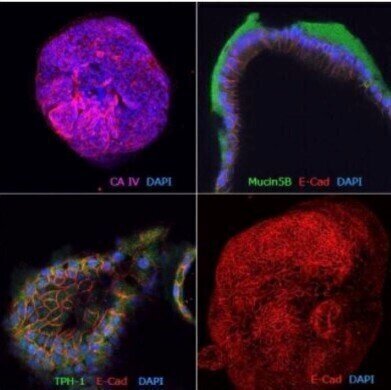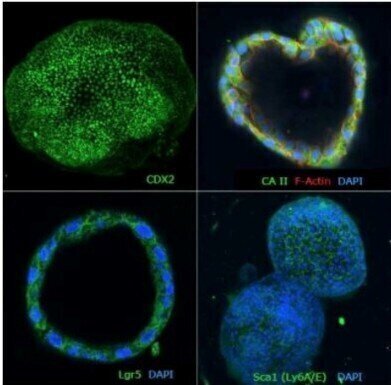-
 Immunocytochemical characterisation of human colon organoids (Colon-87, SCC321). Human colon PDOs are positive for colon-specific markers: CA IV and Mucin5B, and epithelial markers: TPH-1 and E-Cad.
Immunocytochemical characterisation of human colon organoids (Colon-87, SCC321). Human colon PDOs are positive for colon-specific markers: CA IV and Mucin5B, and epithelial markers: TPH-1 and E-Cad. -
 Immunocytochemical characterisation of human colon organoids (Colon-87, SCC321). Human colon PDOs are positive for colon-specific markers: CA II, posterior hindgut marker: CDX2, stem cell markers: Lgr5 and Sca1.
Immunocytochemical characterisation of human colon organoids (Colon-87, SCC321). Human colon PDOs are positive for colon-specific markers: CA II, posterior hindgut marker: CDX2, stem cell markers: Lgr5 and Sca1. -
.jpg) Patient-derived colon organoids from normal (SCC321) patient cultured in L-WRN conditioned media (SCM105) for five passages.
Patient-derived colon organoids from normal (SCC321) patient cultured in L-WRN conditioned media (SCM105) for five passages.
Gastrointestinal Organoid Biobank
Feb 01 2022
Patient derived organoids (PDOs) are novel in vitro 3D cell models that preserve original tissue physiology and molecular pathology, thus representing a clinically-relevant alternative to traditional 2D cell lines and an effective tool to refine and reduce animal models. Merck are now offering a comprehensive biobank of highly characterised tissue-derived human gastrointestinal organoids from normal and diseased patients. Adult tissue derived organoids are phenotypically and genetically stable in long term culture, presenting more mature phenotypes compared to iPSC-derived organoids. Importantly, PDOs have shown to be able to predict patient clinical responses to chemotherapeutics.
The intestinal organoid biobank contains over 50 highly characterised intestinal organoids from both normal and diseased patients derived from multiple regions of the digestive systems including small intestine (duodenum, ileum), stomach, rectum and colon.
3dGRO™ organoids were derived utilising HUB Organoid Technology.
Biobank Overview
- 58 Patient Derived Organoid Samples
- Multiple Genders, Age, and Sex
- Multiple Tissues/Diseases: Colon, Duodenum, Ilium, Stomach, Rectum, Cancer, Ulcerative Colitis, IBS
- RNA-Seq Available
- Low Passage and High Viability
- Cultured in Optimised 3dGRO™ L-WRN Conditioned Media
Events
ACS National Meeting & Expo, Fall 2022
Aug 21 2022Chicago, IL, USA & Online
Aug 22 2022Frankfurt, Germany
Aug 27 2022Maastricht, Netherlands
Aug 28 2022Lisbon, Portugal
Aug 31 2022Singapore


.jpg)


















